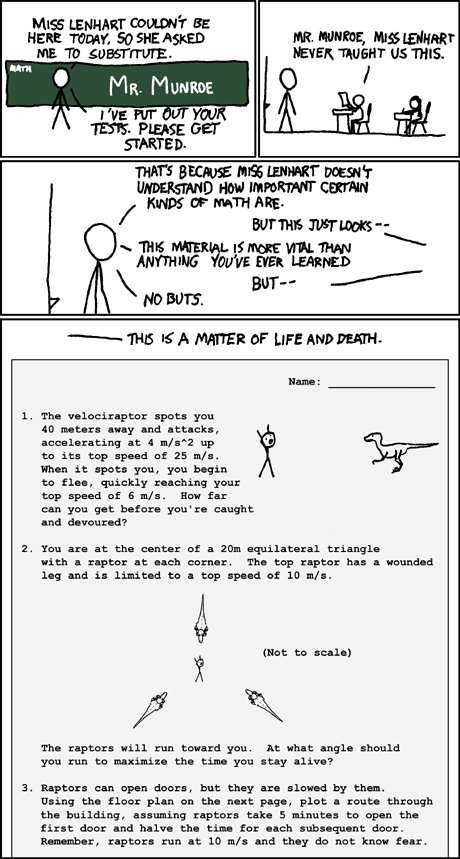
by Brian Switek (http://xkcd.com)
It was the title that hooked me, but then I had a look at this Discovering Biology blog entry and it reminded me of the ability some people have to frame their teaching in such strange, and yet appealing, ways. Obviously dinosaurs aren’t everyone’s thing (I have two small boys who are really into them) and so this sort of work will appeal to some students more than others. But it got me thinking about how we try and help students learn: today I had a bad day with one of my classes – most of them are what we would class as low ability and I feel that I want to do more to try and help them. I think that being more creative with my lessons is the way to go, but I struggle to do this on a regular basis. Hurricane Maine’s blog entry encouraged me and gave me some ideas to work with using projects – they are a “social” class and can work together well, if split into smaller groups (I believe it is also called “divide and conquer”?)
The post from Students 2.0 about creativity, I found to be provoking:
“The key to creativity is the ability and act of transcending tradition. Using this definition, I think creativity is exceptionally rare in schools. Students are almost never asked to transcend tradition and think outside the box.
In fact, doing so is punished. This rarity arises from a confusion about what creativity really is.
If you were to ask most teachers or administrators, you would hear a distinctly different story. Most will says their schools/classrooms stimulate and “unlock” creativity. Unlocking creativity is a scary proposition in and of itself. Who locked it up in the first place?. Doing a word search on school mission statements will turn up an inordinate number of references to creativity. Someone should replace 99% of those occurrences with the word “art.” ”
How much of the education we provide is just expecting students to conform to a very uninspiring teaching method, just for the purpose of having them pass their exams so they can have some sort of options for the next stage of their lives? Just writing about this makes me depressed on their behalf. I would like for them to enjoy learning at school – just as in research (my previous life) there is nothing better than getting the results from an experiment and realising that you have discovered something completely novel, so it would be great if time spent in school could be like this for students – enjoying what they are studying. Part of this, I suspect, demands more creative input into my teaching, and not just plodding through pages and pages of facts that have to be learned.
Dangerously Irrelevant was discussing the merits, or otherwise, of Wikipedia and trying to overcome some teachers’ dislike of this resource. I used to hate it – I hated the fact that anyone could just stick anything on there, and students would think it was solid fact. But in the past few years, it seems to have gotten its act together and, as the article points out, the fact that anyone can add things, or correct them, or discuss them, is one of its great strengths. It is now usually one of my first port of calls when trying to get to grips with a new subject area.






















